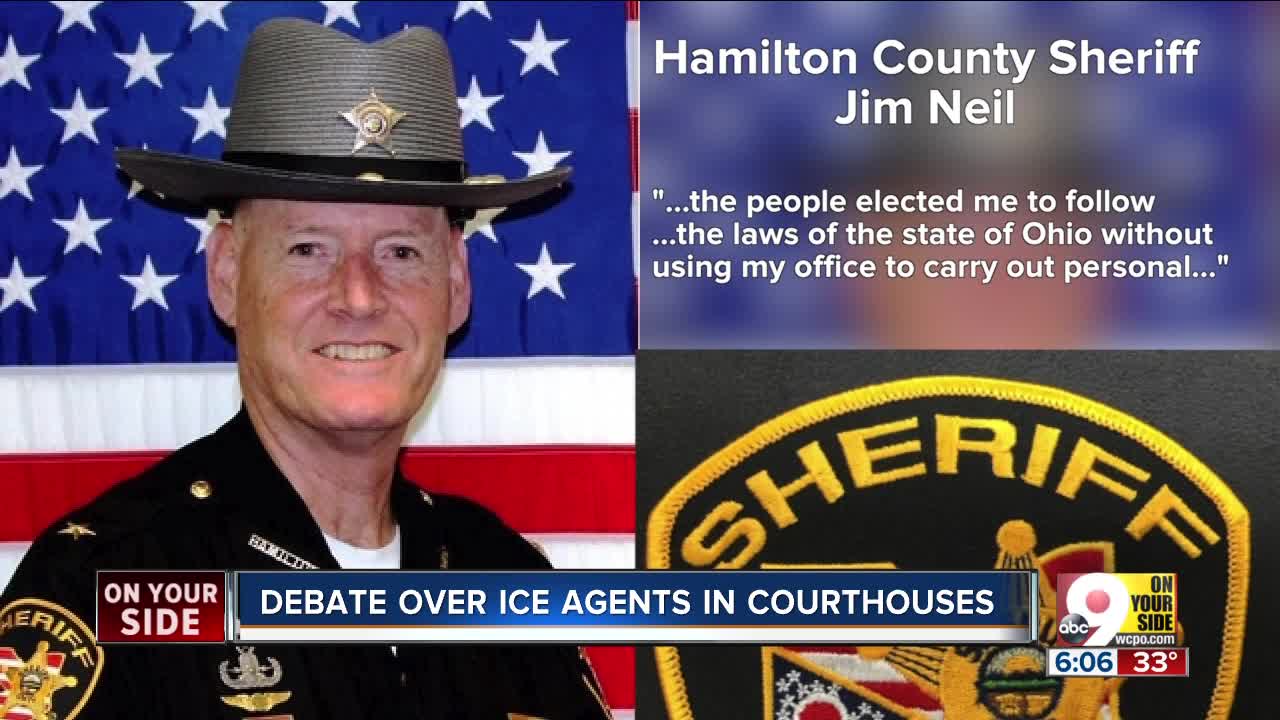CINCINNATI — Policies inside the Hamilton County Courthouse could change in the future, as county officials are examining options on how to deal with the presence, and rights, of immigration agents who seek to detain migrants.
Earlier this month, information came to light that, without the knowledge of Hamilton County's sheriff, Immigration and Customs Enforcement agents have been entering the Hamilton County Courthouse in search of migrants as they come out of courtrooms, according to multiple agencies.
Hamilton County Judge Robert Ruehlman told WCPO he regularly calls U.S. Immigration and Customs Enforcement on defendants in his courtroom when he suspects they could be in the country illegally.
"I call ICE in a minute. I have no problem calling ICE," said common pleas court Judge Ruehlman.
ICE has provided several statements throughout the course of WCPO's reporting, and said it has no plans of stepping out of the courthouse Downtown.
Hamilton County Clerk of Courts Aftab Pureval and Hamilton County Sheriff Jim Neil have expressed that, while they recognize a federal agency's right to be inside the courthouse, they would have preferred to be notified of the agency's actions. Now, Pureval said his office is looking at options for how to move forward.
"My office is looking at best practices from other jurisdictions to protect people with business in the courthouse," he said in a text message. "We will announce our findings and recommendations soon."
So far, three states in the U.S. have banned ICE in and around courthouses: New York, New Jersey and Oregon. Nancy Sullivan, a local migrant advocate working with Transformations CDC, is researching these states' bans and said Washington state is also working on a bill that would prevent ICE from detaining migrants within the walls of a courthouse.
"Yes, there is a role, but our courts have to be open to everyone on an equal basis," said Sullivan.
Attorney Richard Goldberg said that, although ICE has a federal right to enter courthouses to detain people, reports of judges like Ruehlman calling the agency specifically could raise ethical concerns. He said calling ICE should be a prosecutor's job, not a judge's.
"I think the issue is debatable because everybody has a right to report what they think is a crime," said Goldberg. "But a judge has a unique role and they have to be totally above partiality.”
Ruehlman said he calls ICE "10 to 20” times a year.
Sheriff Neil said either way the wind blows, his deputies will follow the law they are intended to uphold.
"The people elected me to follow and enforce the laws of the State of Ohio, without using my office to carry out personal or political agendas," Neil wrote in a statement. "Should the legislators pass a law or the Court issue an order that prohibits ICE from engaging in enforcement action in the Courthouse, I will enforce such a law or court order."
He also said he does believe that victims of crimes or witnesses to a crime should be able to participate in the United States justice system.
"As a 40 year law enforcement officer, it is important that anyone who is a victim or witness to a crime should be able to fully participate in the judicial process to further justice and remove dangerous criminals from our streets," his statement reads.
Pureval and Neil previously expressed concern that ICE's presence in the courthouse could interfere with the judicial process.
ICE provided the following written statement in response to WCPO's request for comment:
ICE officers have been provided broad at-large arrest authority by Congress and may lawfully arrest removable aliens in courthouses. This arrest authority is central to ICE’s mission which focuses first on criminal aliens.
ICE values the partnerships that help the agency carry this mission out.



